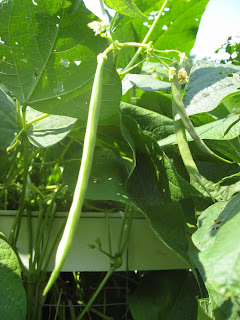It's the time of year when fruits and veggies mature as fast (or faster) than we can bring them in and process them. It's a good problem to have, because it means the urban farm is increasingly productive and we'll have plenty of organic food to eat all winter.
Pole beans are growing like crazy. We pick a bucket of beans every day, blanch and flash freeze.
The tomatoes continue to arrive at an impressive rate. This is a fruit with plenty of options. I've roasted, pureed and frozen some of it, and canned simple tomato sauce. Soon I'll make pizza sauce, barbecue sauce and salsa, canning it for stable shelf storage because my freezer is getting quite full.
Our little peach tree has hit its stride. We've harvested more than sixty pounds of fruit from one tree, virtually without blemish. I've frozen peach slices for future pies; canned peaches in spiced honey syrup; canned more peaches in rum sauce; and canned even more peaches in a simple honey syrup. When I'm too exhausted to care, I just cut them into a freezer container, sprinkle it with a teaspoon of sugar, and put it in the freezer. We're approaching the end of the peach crop. Whew!
So if I seem like I haven't written, called or blogged lately, now you know why!











